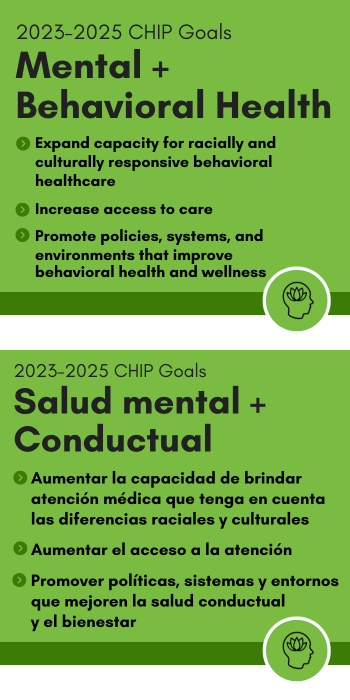Mental + Behavioral healthcare integration and expansion

Mental health problems are among the most common health conditions in the U.S., with one in five adults experiencing mental illness each year. With the onset of COVID-19, the already strained mental health system was hit by a perfect storm of personal fear and anxiety, societal and political upheaval, forced isolation, loss of life, and an economic downturn, coupled with unprecedented challenges for the behavioral health workforce.
Black, Latino, and multi-racial adults in Virginia reported higher rates of depression throughout the pandemic than White and Asian Virginians.
At the same time, Virginia has a long-standing shortage of behavioral health workers, with access to behavioral health providers varying widely within BRHD, exacerbated by a critical shortage of in-patient psychiatric beds. The shortage is even more acute among practitioners of color, with Black and Latinx psychiatrists and psychologists each representing under 8% of the mental health workforce.
The Mental + Behavioral Health workgroup, convened by the Community Mental Health and Wellness Coalition (CMHWC), is acutely aware of these issues. A network of over 20 organizations that serve the entire District, CMHWC will concentrate its CHIP work on policy change at the health system, legislative, and workforce levels – engaging leadership from both UVA Health and Sentara Martha Jefferson Hospital.
CHIP objectives address the need to expand capacity for racially and culturally responsive behavioral health care; increase access to care (such as by increasing in-patient psychiatric beds); and promote policies, systems, and environments that improve behavioral health and wellness – particularly for people of color. The workgroup is currently identifying conveners and clarifying both indicators and targets.
Mental + Behavioral Health Workgroup: Mental Health and Wellness Coalition Steering Committee (CMHWC) which includes: Albemarle County Fire and Rescue, Blue Ridge Health District, Charlottesville-Albemarle Rescue Squad, City of Charlottesville, Counseling Alliance of Virginia, Region Ten, The Women’s Initiative, Sentara Martha Jefferson Hospital, UVA Health.
CHIP Goals + Objectives | 2023-2025 CHIP Report
|
GOAL |
Objective | Convener | Lead Contributors | Target Date | Indicator | Target |
| 1.Improved mental and behavioral health policy and planning | 1.1 Create a plan for shared advocacy, planning, and accountability | Community Mental Health and Wellness Coalition Steering Committee (CMHWC) | Sentara Martha Jefferson Hospital
UVA Health |
12/31/2024 | #plans published for advocacy, planning, and accountability by 05/01/2024 | 1 |
| 1.2 Adopt anti-racist policies, practices and procedures | TBD | TBD | 12/31/2024 | TBD | TBD | |
| 1.3 Develop resilient and growing workforce that reflects the community | TBD | Albemarle County Fire & Rescue
Sentara Martha Jefferson Hospital UVA Health/ |
12/31/2025 | TBD | TBD | |
| 2.Expanded behavioral health promotion and community health hubs | 2.1 Expand behavioral health promotion efforts | TBD | TBD | 09/01/2025 | TBD | TBD |
| 3.Improved treatment and recovery services | 3.1 Provide comprehensive, accessible, culturallyresponsive adult outpatient services | TBD | Sentara Martha Jefferson Hospital
UVA Health |
12/31/2025 | # adults receiving comprehensive, accessible, culturally responsive outpatient services during 2023-2025 | 500 |
| 3.2 Provide expanded continuum of youth services | TBD | TBD | 12/31/2025 | # youth receiving expanded continuum of services during 2023-2025 | 500 | |
| 4. Quality, equitable, crisis response service | 4.1 Promote neighboring models and existing local efforts | TBD | TBD | 12/31/2025 | TBD | TBD |
| 4.2 Develop regional mobile service response (24/7,365) | TBD | TBD | 12/31/2025 | TBD | TBD | |
| 4.3 Inventory treatment capacity (locations depending on needs)
|
TBD | TBD | 12/31/2025 | TBD | TBD | |
| 4.4 Create regional policy for data sharing/care coordination | TBD | TBD | 12/31/2025 | TBD | TBD |
Follow the next policy target: Transportation>>
